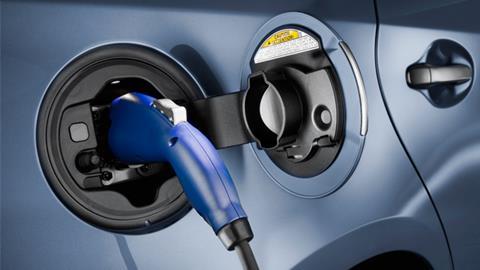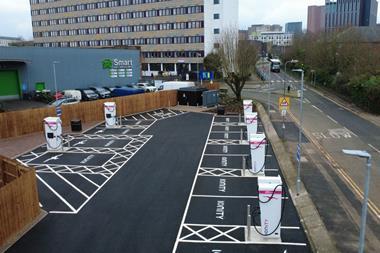A site has been chosen for a trial of new technology that could deliver town centre electric vehicle (EV) rapid chargers without the need for additional electricity infrastructure.

The scheme is a partnership between Western Power Distribution, which is the electricity distribution network operator for the Midlands, South West and Wales, and Ricardo Energy and Environment.
The partners claim new technology being trialled in the DC Share project could help deliver an estimated 217,000 Electric Vehicle (EV) chargers in urban spaces across the Midlands, South Wales and South West.
They say that if it is expanded across other UK electricity networks, DC Share’s technology could save customers an estimated £162m in network reinforcement costs by 2050. These savings will be made by allowing network providers to make smarter use of the existing electricity network, by harnessing spare capacity within existing substations, rather than investing millions in new infrastructure.
The DC Share project, which has received over £4.7m in funding through Ofgem’s Network Innovation Competition, will test a new method of pooling spare network capacity from several local substations. This will enable low carbon infrastructure, such as rapid EV chargers or battery energy storage, to be quickly connected without the need for expensive network reinforcement.
They add that DC Share’s approach will be particularly useful in dense urban communities, where there is a lack of available space for building a larger network of substations.
The trial in Taunton, Somerset, will use equipment to link four local substations across the town centre, sharing their unused capacity to power 15 rapid EV chargers, including five 100kW rapid chargers intended to recharge the average electric vehicle in around 30 minutes.
With building work scheduled throughout 2021, the rapid EV chargers are due to be available for public use by the Spring of 2022.
Ricky Duke, WPD Innovation & Low Carbon Network Engineer, commented: “Today’s confirmation of Taunton as the DC Share project site is an important step to securing the massive savings and decarbonisation benefits that DC meshing technology could bring to the UK.
“As we look beyond Covid-19 towards the UK’s goal of Net Zero by 2050, innovative, low carbon technologies will be at the heart of the UK’s green recovery. Insights from DC Share will have a key role in helping us to build a stronger and cleaner UK economy.
“DC Share is a win-win: this technology will allow us to rapidly decarbonise transport by making smarter use of existing infrastructure. That means less carbon emissions, while reducing the need for expensive infrastructure and network reinforcements in constrained urban communities.”
Michael Feasey, the overall project manager from Ricardo, said: “This project takes UK networks another step forward in developing flexible networks and supporting the mass adoption of electric vehicles. By using a DC equalisation network to support the existing infrastructure and to facilitate large demand from rapid chargers, we are demonstrating that there are alternatives to traditional reinforcement. We are delighted to be using the combined expertise from all project partners to help the UK transition to a low-carbon economy.”
Local constituency MP and environment minister Rebecca Pow said,:“It is wonderful news that Taunton is leading the way in decarbonising road transport, helping people to make the switch to EVs.
Councillor Peter Pilkington, the Lead Member for Climate Change at Somerset West and Taunton Council commented: “We’re delighted to host this ground-breaking low carbon energy trial, bringing essential EV charging infrastructure to the local residents of Taunton.
“This complements Somerset West and Taunton initiatives across the wider district such as our rural electric vehicle charging point fund for parish and town councils. Encouraging and enabling the use of electric vehicles is an important part of working towards making the council and the area as a whole carbon neutral by 2030.”

































No comments yet